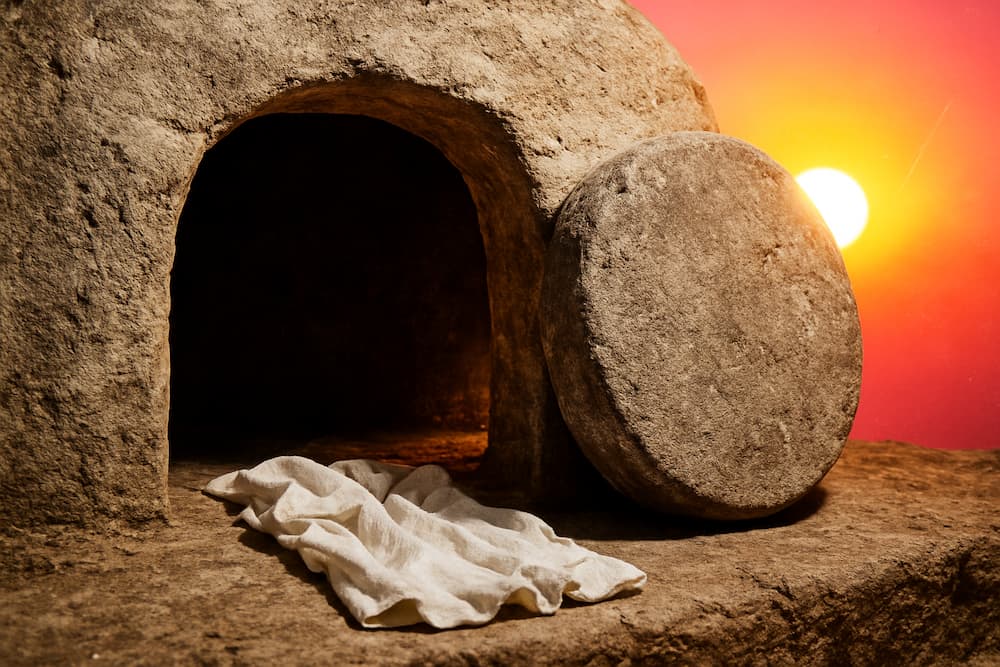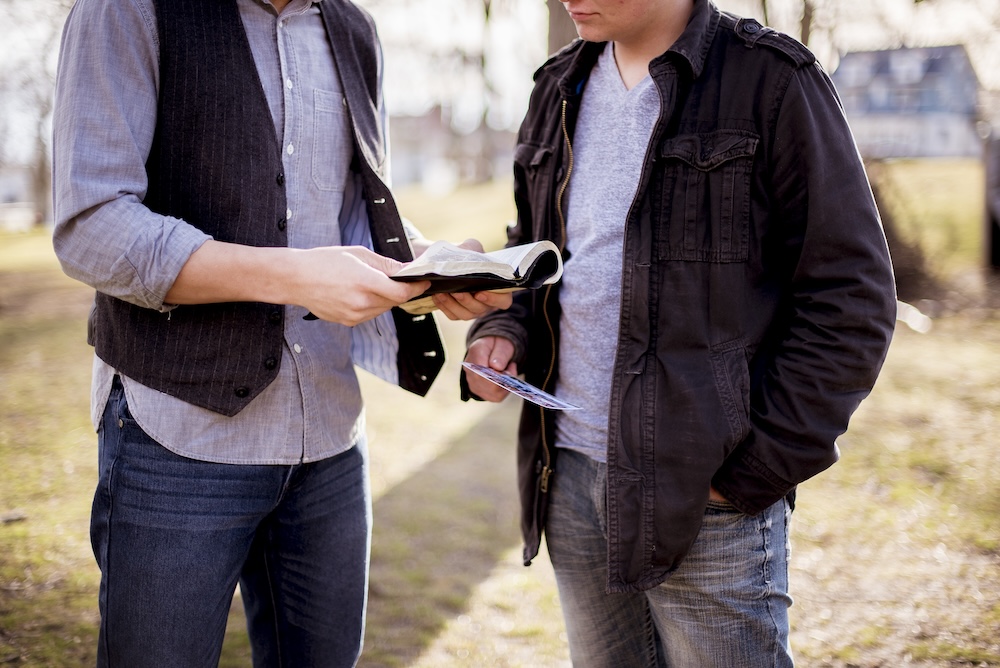How to Set Aside Time to Pray
From baby believers to seminary professors, from homeschool moms to full-time pastors—we all struggle when it comes to this gritty discipline of making prayer in solitude a part of our regular schedule. This, then, is where we must begin our pilgrimage—with a set time of day and a consistent length of time for prayer.

Recently someone asked me what I thought was the hardest thing about prayer for most people.
I didn’t have to think twice.
The toughest part, no question, is setting aside the time and sticking with it.
From baby believers to seminary professors, from homeschool moms to full-time pastors—we all struggle when it comes to this gritty discipline of making prayer in solitude a part of our regular schedule. This, then, is where we must begin our pilgrimage—with a set time of day and a consistent length of time for prayer.
A Set Time
When should we spend time in prayer? Does the time of day matter?
This is a decision you alone can make.
But as you do, consider these biblical examples. David, the psalmist, seems to have sought God often in the early morning hours.
In the morning, Lord, you hear my voice;
in the morning I lay my requests before you and wait expectantly.
(Psalm 5:3)
But I cry to you for help, Lord;
in the morning my prayer comes before you.
(Psalm 88:13)
I rise before dawn and cry for help;
I have put my hope in your word.
(Psalm 119:147)
Isaiah, the prophet who encountered God’s glory in the temple, reflected:
The Sovereign Lord has given me a well-instructed tongue,
to know the word that sustains the weary.
He wakens me morning by morning,
wakens my ear to listen like one being instructed.
(Isaiah 50:4, emphasis added)
I prefer the early morning for several reasons. First, it enables me to recalibrate my heart so that I am more aware of God’s presence and perspective throughout the day.
Second, when prayer is the first thing I do, other things can’t as easily crowd it out. Although I try to commune with God throughout the day, I want my first moments to be his, to hear Jesus before all the other voices that clamor for my attention.
Another time may work better for you. We all experience seasons of life where mornings just won’t work. Jesus went away in the night, middle of the day, and early-morning hours to be alone with God.
The important thing is to find a time that works on a regular basis and stick with it. Our nature adapts to consistency—the neural pathways in our brains deepen with the habits we keep, making it easier to follow through with less effort. If you change the time of day often, you will probably find it hard to establish a pattern of daily prayer.
But on days when you feel like you have failed, envision Jesus standing as a friend, knocking patiently at the door of your heart—always eager to come in and hang out with you.
A Reasonable Goal
How long should we pray?
When people asked Albert Einstein to explain his theory of relativity in lay terms, he instructed his secretary to tell them: “An hour sitting with a pretty girl on a park bench passes like a minute, but a minute sitting on a hot stove seems like an hour.”
The amount of time we decide to spend with God is relative, depending on our outlook. If we are duty-driven or see ourselves as fulfilling some religious obligation, no matter how short the amount of time we spend, it’s going to feel burdensome, like sitting on a hot stove!
If, however, we can grasp that prayer is a privilege and a grace, the question shifts. We look forward to the privilege of being with God and ask for grace to grow right where we are at.
Thus, if you have been having quiet times for years, you may want to press into longer seasons of solitude. If this is something new or you have struggled to be disciplined in this area, just set a reasonable goal and ask God to enable you to follow through.
As I’ve noted, because of the way our brains work, if we set aside as little as ten minutes every day, we will develop a practice of prayer more consistently than if we pray at sporadic times throughout the week. Yet, there are seasons when this isn’t possible, and it makes more sense to carve out longer chunks less often.
Remember, this is your pilgrimage—no one else’s. God looks at your heart and is touched by your desire to be with him.
Practicing Prayer: Time Out to Think about Time
Preparing Your Heart
Become still and quiet in God’s presence. Settle your soul by breathing deeply, with your feet planted on the ground and your body in a comfortable position. Consider that you are here because God has invited you and given you grace to respond. Ask him to speak in love, drawing you to himself. Pray for wisdom and clarity as you think about time.
Pressing In
Answer the following questions, taking your time to be thoughtful and prayerful about your responses.
Read Psalm 39:4-7 and Psalm 90:10-12.
Show me, Lord, my life’s end
and the number of my days;
let me know how fleeting my life is.
You have made my days a mere handbreadth;
the span of my years is as nothing before you.
Everyone is but a breath,
even those who seem secure.
“Surely everyone goes around like a mere phantom;
in vain they rush about, heaping up wealth
without knowing whose it will finally be.
“But now, Lord, what do I look for?
My hope is in you.
(Psalm 39:4-7)
Our days may come to seventy years,
or eighty, if our strength endures;
yet the best of them are but trouble and sorrow,
for they quickly pass, and we fly away.
If only we knew the power of your anger!
Your wrath is as great as the fear that is your due.
Teach us to number our days,
that we may gain a heart of wisdom.
(Psalm 90:10-12)
- What were the psalmists’ perspectives on time?
- How do these perspectives speak to the process of planning for daily prayer time?
- How much time do you normally spend, if any, in quiet prayer, getting to know God?
- How much time would you like to be able to spend?
- What are the things that keep you from spending as much time as you would like?
- What would be a realistic amount of time to commit to spending with God on a consistent basis?
- What is the best time of day for you to be alone with God?
- What will be the hindrances to this time?
- What can you do to minimize these distractions?
End by thanking God that though he dwells outside of time, he is eager to enter into your minutes and hours and days to meet with you.
The article above is an excerpt from Tricia’s book The Soul at Rest. Find it on Amazon here.
Sign Up for Product Updates
Recently someone asked me what I thought was the hardest thing about prayer for most people.
I didn’t have to think twice.
The toughest part, no question, is setting aside the time and sticking with it.
From baby believers to seminary professors, from homeschool moms to full-time pastors—we all struggle when it comes to this gritty discipline of making prayer in solitude a part of our regular schedule. This, then, is where we must begin our pilgrimage—with a set time of day and a consistent length of time for prayer.
A Set Time
When should we spend time in prayer? Does the time of day matter?
This is a decision you alone can make.
But as you do, consider these biblical examples. David, the psalmist, seems to have sought God often in the early morning hours.
In the morning, Lord, you hear my voice;
in the morning I lay my requests before you and wait expectantly.
(Psalm 5:3)
But I cry to you for help, Lord;
in the morning my prayer comes before you.
(Psalm 88:13)
I rise before dawn and cry for help;
I have put my hope in your word.
(Psalm 119:147)
Isaiah, the prophet who encountered God’s glory in the temple, reflected:
The Sovereign Lord has given me a well-instructed tongue,
to know the word that sustains the weary.
He wakens me morning by morning,
wakens my ear to listen like one being instructed.
(Isaiah 50:4, emphasis added)
I prefer the early morning for several reasons. First, it enables me to recalibrate my heart so that I am more aware of God’s presence and perspective throughout the day.
Second, when prayer is the first thing I do, other things can’t as easily crowd it out. Although I try to commune with God throughout the day, I want my first moments to be his, to hear Jesus before all the other voices that clamor for my attention.
Another time may work better for you. We all experience seasons of life where mornings just won’t work. Jesus went away in the night, middle of the day, and early-morning hours to be alone with God.
The important thing is to find a time that works on a regular basis and stick with it. Our nature adapts to consistency—the neural pathways in our brains deepen with the habits we keep, making it easier to follow through with less effort. If you change the time of day often, you will probably find it hard to establish a pattern of daily prayer.
But on days when you feel like you have failed, envision Jesus standing as a friend, knocking patiently at the door of your heart—always eager to come in and hang out with you.
A Reasonable Goal
How long should we pray?
When people asked Albert Einstein to explain his theory of relativity in lay terms, he instructed his secretary to tell them: “An hour sitting with a pretty girl on a park bench passes like a minute, but a minute sitting on a hot stove seems like an hour.”
The amount of time we decide to spend with God is relative, depending on our outlook. If we are duty-driven or see ourselves as fulfilling some religious obligation, no matter how short the amount of time we spend, it’s going to feel burdensome, like sitting on a hot stove!
If, however, we can grasp that prayer is a privilege and a grace, the question shifts. We look forward to the privilege of being with God and ask for grace to grow right where we are at.
Thus, if you have been having quiet times for years, you may want to press into longer seasons of solitude. If this is something new or you have struggled to be disciplined in this area, just set a reasonable goal and ask God to enable you to follow through.
As I’ve noted, because of the way our brains work, if we set aside as little as ten minutes every day, we will develop a practice of prayer more consistently than if we pray at sporadic times throughout the week. Yet, there are seasons when this isn’t possible, and it makes more sense to carve out longer chunks less often.
Remember, this is your pilgrimage—no one else’s. God looks at your heart and is touched by your desire to be with him.
Practicing Prayer: Time Out to Think about Time
Preparing Your Heart
Become still and quiet in God’s presence. Settle your soul by breathing deeply, with your feet planted on the ground and your body in a comfortable position. Consider that you are here because God has invited you and given you grace to respond. Ask him to speak in love, drawing you to himself. Pray for wisdom and clarity as you think about time.
Pressing In
Answer the following questions, taking your time to be thoughtful and prayerful about your responses.
Read Psalm 39:4-7 and Psalm 90:10-12.
Show me, Lord, my life’s end
and the number of my days;
let me know how fleeting my life is.
You have made my days a mere handbreadth;
the span of my years is as nothing before you.
Everyone is but a breath,
even those who seem secure.
“Surely everyone goes around like a mere phantom;
in vain they rush about, heaping up wealth
without knowing whose it will finally be.
“But now, Lord, what do I look for?
My hope is in you.
(Psalm 39:4-7)
Our days may come to seventy years,
or eighty, if our strength endures;
yet the best of them are but trouble and sorrow,
for they quickly pass, and we fly away.
If only we knew the power of your anger!
Your wrath is as great as the fear that is your due.
Teach us to number our days,
that we may gain a heart of wisdom.
(Psalm 90:10-12)
- What were the psalmists’ perspectives on time?
- How do these perspectives speak to the process of planning for daily prayer time?
- How much time do you normally spend, if any, in quiet prayer, getting to know God?
- How much time would you like to be able to spend?
- What are the things that keep you from spending as much time as you would like?
- What would be a realistic amount of time to commit to spending with God on a consistent basis?
- What is the best time of day for you to be alone with God?
- What will be the hindrances to this time?
- What can you do to minimize these distractions?
End by thanking God that though he dwells outside of time, he is eager to enter into your minutes and hours and days to meet with you.
The article above is an excerpt from Tricia’s book The Soul at Rest. Find it on Amazon here.
podcast transcript
Recently someone asked me what I thought was the hardest thing about prayer for most people.
I didn’t have to think twice.
The toughest part, no question, is setting aside the time and sticking with it.
From baby believers to seminary professors, from homeschool moms to full-time pastors—we all struggle when it comes to this gritty discipline of making prayer in solitude a part of our regular schedule. This, then, is where we must begin our pilgrimage—with a set time of day and a consistent length of time for prayer.
A Set Time
When should we spend time in prayer? Does the time of day matter?
This is a decision you alone can make.
But as you do, consider these biblical examples. David, the psalmist, seems to have sought God often in the early morning hours.
In the morning, Lord, you hear my voice;
in the morning I lay my requests before you and wait expectantly.
(Psalm 5:3)
But I cry to you for help, Lord;
in the morning my prayer comes before you.
(Psalm 88:13)
I rise before dawn and cry for help;
I have put my hope in your word.
(Psalm 119:147)
Isaiah, the prophet who encountered God’s glory in the temple, reflected:
The Sovereign Lord has given me a well-instructed tongue,
to know the word that sustains the weary.
He wakens me morning by morning,
wakens my ear to listen like one being instructed.
(Isaiah 50:4, emphasis added)
I prefer the early morning for several reasons. First, it enables me to recalibrate my heart so that I am more aware of God’s presence and perspective throughout the day.
Second, when prayer is the first thing I do, other things can’t as easily crowd it out. Although I try to commune with God throughout the day, I want my first moments to be his, to hear Jesus before all the other voices that clamor for my attention.
Another time may work better for you. We all experience seasons of life where mornings just won’t work. Jesus went away in the night, middle of the day, and early-morning hours to be alone with God.
The important thing is to find a time that works on a regular basis and stick with it. Our nature adapts to consistency—the neural pathways in our brains deepen with the habits we keep, making it easier to follow through with less effort. If you change the time of day often, you will probably find it hard to establish a pattern of daily prayer.
But on days when you feel like you have failed, envision Jesus standing as a friend, knocking patiently at the door of your heart—always eager to come in and hang out with you.
A Reasonable Goal
How long should we pray?
When people asked Albert Einstein to explain his theory of relativity in lay terms, he instructed his secretary to tell them: “An hour sitting with a pretty girl on a park bench passes like a minute, but a minute sitting on a hot stove seems like an hour.”
The amount of time we decide to spend with God is relative, depending on our outlook. If we are duty-driven or see ourselves as fulfilling some religious obligation, no matter how short the amount of time we spend, it’s going to feel burdensome, like sitting on a hot stove!
If, however, we can grasp that prayer is a privilege and a grace, the question shifts. We look forward to the privilege of being with God and ask for grace to grow right where we are at.
Thus, if you have been having quiet times for years, you may want to press into longer seasons of solitude. If this is something new or you have struggled to be disciplined in this area, just set a reasonable goal and ask God to enable you to follow through.
As I’ve noted, because of the way our brains work, if we set aside as little as ten minutes every day, we will develop a practice of prayer more consistently than if we pray at sporadic times throughout the week. Yet, there are seasons when this isn’t possible, and it makes more sense to carve out longer chunks less often.
Remember, this is your pilgrimage—no one else’s. God looks at your heart and is touched by your desire to be with him.
Practicing Prayer: Time Out to Think about Time
Preparing Your Heart
Become still and quiet in God’s presence. Settle your soul by breathing deeply, with your feet planted on the ground and your body in a comfortable position. Consider that you are here because God has invited you and given you grace to respond. Ask him to speak in love, drawing you to himself. Pray for wisdom and clarity as you think about time.
Pressing In
Answer the following questions, taking your time to be thoughtful and prayerful about your responses.
Read Psalm 39:4-7 and Psalm 90:10-12.
Show me, Lord, my life’s end
and the number of my days;
let me know how fleeting my life is.
You have made my days a mere handbreadth;
the span of my years is as nothing before you.
Everyone is but a breath,
even those who seem secure.
“Surely everyone goes around like a mere phantom;
in vain they rush about, heaping up wealth
without knowing whose it will finally be.
“But now, Lord, what do I look for?
My hope is in you.
(Psalm 39:4-7)
Our days may come to seventy years,
or eighty, if our strength endures;
yet the best of them are but trouble and sorrow,
for they quickly pass, and we fly away.
If only we knew the power of your anger!
Your wrath is as great as the fear that is your due.
Teach us to number our days,
that we may gain a heart of wisdom.
(Psalm 90:10-12)
- What were the psalmists’ perspectives on time?
- How do these perspectives speak to the process of planning for daily prayer time?
- How much time do you normally spend, if any, in quiet prayer, getting to know God?
- How much time would you like to be able to spend?
- What are the things that keep you from spending as much time as you would like?
- What would be a realistic amount of time to commit to spending with God on a consistent basis?
- What is the best time of day for you to be alone with God?
- What will be the hindrances to this time?
- What can you do to minimize these distractions?
End by thanking God that though he dwells outside of time, he is eager to enter into your minutes and hours and days to meet with you.
The article above is an excerpt from Tricia’s book The Soul at Rest. Find it on Amazon here.
VIDEO transcript
Recently someone asked me what I thought was the hardest thing about prayer for most people.
I didn’t have to think twice.
The toughest part, no question, is setting aside the time and sticking with it.
From baby believers to seminary professors, from homeschool moms to full-time pastors—we all struggle when it comes to this gritty discipline of making prayer in solitude a part of our regular schedule. This, then, is where we must begin our pilgrimage—with a set time of day and a consistent length of time for prayer.
A Set Time
When should we spend time in prayer? Does the time of day matter?
This is a decision you alone can make.
But as you do, consider these biblical examples. David, the psalmist, seems to have sought God often in the early morning hours.
In the morning, Lord, you hear my voice;
in the morning I lay my requests before you and wait expectantly.
(Psalm 5:3)
But I cry to you for help, Lord;
in the morning my prayer comes before you.
(Psalm 88:13)
I rise before dawn and cry for help;
I have put my hope in your word.
(Psalm 119:147)
Isaiah, the prophet who encountered God’s glory in the temple, reflected:
The Sovereign Lord has given me a well-instructed tongue,
to know the word that sustains the weary.
He wakens me morning by morning,
wakens my ear to listen like one being instructed.
(Isaiah 50:4, emphasis added)
I prefer the early morning for several reasons. First, it enables me to recalibrate my heart so that I am more aware of God’s presence and perspective throughout the day.
Second, when prayer is the first thing I do, other things can’t as easily crowd it out. Although I try to commune with God throughout the day, I want my first moments to be his, to hear Jesus before all the other voices that clamor for my attention.
Another time may work better for you. We all experience seasons of life where mornings just won’t work. Jesus went away in the night, middle of the day, and early-morning hours to be alone with God.
The important thing is to find a time that works on a regular basis and stick with it. Our nature adapts to consistency—the neural pathways in our brains deepen with the habits we keep, making it easier to follow through with less effort. If you change the time of day often, you will probably find it hard to establish a pattern of daily prayer.
But on days when you feel like you have failed, envision Jesus standing as a friend, knocking patiently at the door of your heart—always eager to come in and hang out with you.
A Reasonable Goal
How long should we pray?
When people asked Albert Einstein to explain his theory of relativity in lay terms, he instructed his secretary to tell them: “An hour sitting with a pretty girl on a park bench passes like a minute, but a minute sitting on a hot stove seems like an hour.”
The amount of time we decide to spend with God is relative, depending on our outlook. If we are duty-driven or see ourselves as fulfilling some religious obligation, no matter how short the amount of time we spend, it’s going to feel burdensome, like sitting on a hot stove!
If, however, we can grasp that prayer is a privilege and a grace, the question shifts. We look forward to the privilege of being with God and ask for grace to grow right where we are at.
Thus, if you have been having quiet times for years, you may want to press into longer seasons of solitude. If this is something new or you have struggled to be disciplined in this area, just set a reasonable goal and ask God to enable you to follow through.
As I’ve noted, because of the way our brains work, if we set aside as little as ten minutes every day, we will develop a practice of prayer more consistently than if we pray at sporadic times throughout the week. Yet, there are seasons when this isn’t possible, and it makes more sense to carve out longer chunks less often.
Remember, this is your pilgrimage—no one else’s. God looks at your heart and is touched by your desire to be with him.
Practicing Prayer: Time Out to Think about Time
Preparing Your Heart
Become still and quiet in God’s presence. Settle your soul by breathing deeply, with your feet planted on the ground and your body in a comfortable position. Consider that you are here because God has invited you and given you grace to respond. Ask him to speak in love, drawing you to himself. Pray for wisdom and clarity as you think about time.
Pressing In
Answer the following questions, taking your time to be thoughtful and prayerful about your responses.
Read Psalm 39:4-7 and Psalm 90:10-12.
Show me, Lord, my life’s end
and the number of my days;
let me know how fleeting my life is.
You have made my days a mere handbreadth;
the span of my years is as nothing before you.
Everyone is but a breath,
even those who seem secure.
“Surely everyone goes around like a mere phantom;
in vain they rush about, heaping up wealth
without knowing whose it will finally be.
“But now, Lord, what do I look for?
My hope is in you.
(Psalm 39:4-7)
Our days may come to seventy years,
or eighty, if our strength endures;
yet the best of them are but trouble and sorrow,
for they quickly pass, and we fly away.
If only we knew the power of your anger!
Your wrath is as great as the fear that is your due.
Teach us to number our days,
that we may gain a heart of wisdom.
(Psalm 90:10-12)
- What were the psalmists’ perspectives on time?
- How do these perspectives speak to the process of planning for daily prayer time?
- How much time do you normally spend, if any, in quiet prayer, getting to know God?
- How much time would you like to be able to spend?
- What are the things that keep you from spending as much time as you would like?
- What would be a realistic amount of time to commit to spending with God on a consistent basis?
- What is the best time of day for you to be alone with God?
- What will be the hindrances to this time?
- What can you do to minimize these distractions?
End by thanking God that though he dwells outside of time, he is eager to enter into your minutes and hours and days to meet with you.
The article above is an excerpt from Tricia’s book The Soul at Rest. Find it on Amazon here.




























